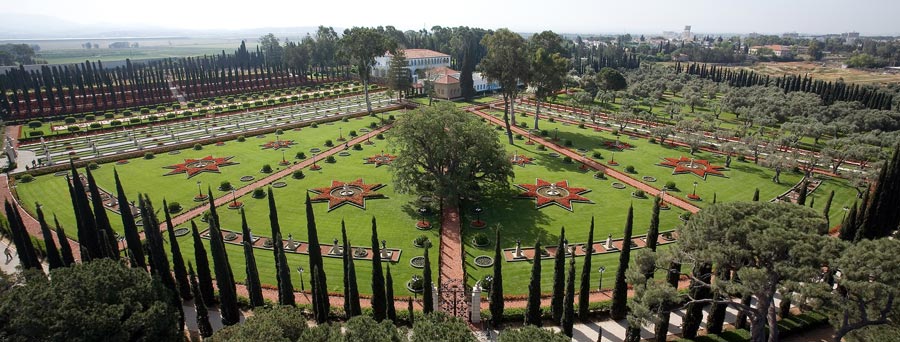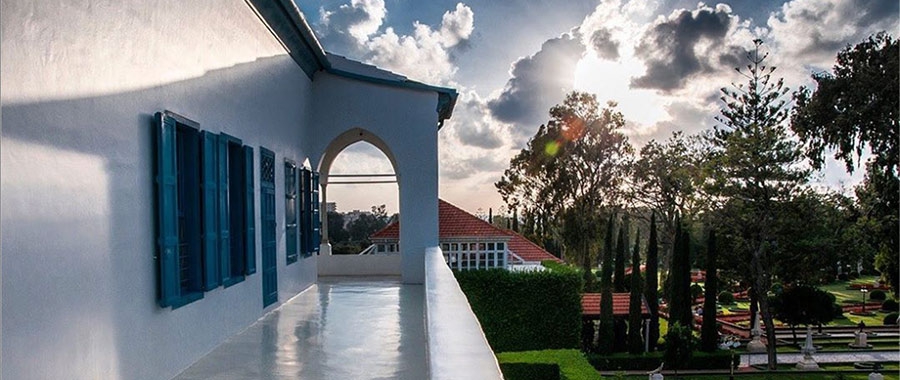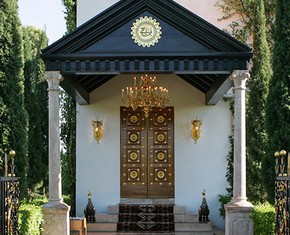The views expressed in our content reflect individual perspectives and do not represent the authoritative views of the Baha'i Faith.
Baha’u’llah, the prophet and founder of the Baha’i Faith, left this physical world 127 years ago today, on May 29th, 1892. Tonight, Baha’is everywhere will observe that somber anniversary.
Baha’u’llah’s passing, now commemorated around the world by people of every nationality, race, ethnicity and former Faith, set in motion a remarkable chain of events that spread the Baha’i Faith to every corner of the Earth.

The Shrine of Baha’u’llah and Bahji Gardens.
Baha’u’llah was seventy-five years old when he passed away. His remarkable life included an astounding number of both heroic and harrowing events—as a Persian nobleman, a poet, a mystic, his country’s acknowledged and celebrated “Father of the Poor,” a prisoner of conscience for 40 years, a torture victim, an exile, and above all, the prophet who promulgated the world’s newest and second-most widespread religion, the Baha’i Faith.
Since his passing, Baha’u’llah’s life has become a model of spiritual and social progress for millions of people all around the world. Baha’is come from every class, every nation, every racial group and every former Faith—and commit their lives to universal fellowship and love, following the ideals and principles Baha’u’llah taught.
When Baha’u’llah passed into the next world in 1892, many observers and historians wondered if his new Faith would survive. But the Baha’i Faith not only survived, it thrived, grew rapidly and spread to every continent—without splitting up into the hostile sects and warring divisions that frequently plague new religions soon after the deaths of their founders.
When the founders of the world’s great Faiths passed away, often as a result of the violent opposition their radical teachings first generated among the prevailing cultures they appeared in, their followers typically struggled to keep their teachings alive. Few in number, severely persecuted, misunderstood, exiled, tortured and imprisoned, the early Jews and Buddhists and Christians and Muslims—and the early Baha’is—suffered tremendously. Many were killed for their beliefs, with entire governments attempting to exterminate them. Cast out of their societies, they wondered, in their weakest moments, if their new Faiths would make it.
That same dynamic happened when Baha’u’llah passed away in 1892. Forced out of Persia by its government and the ecclesiastical authorities and successively banished to Baghdad in 1852; then from Baghdad to Constantinople in 1863; then to Adrianople (now Edirne) in 1867; and finally to the prison-city of Acre (Akka) in Palestine (now Israel) later in 1867; Baha’u’llah ultimately spent forty years as a prisoner of conscience. His followers suffered enormous persecution, torture and martyrdom.
However, along the way, and despite the terrible conditions he endured in prison, Baha’u’llah taught an emergent Faith with new, progressive principles: the independent investigation of truth, the unity of all religions, the oneness of God and humanity, the equality of men and women, the agreement of science and religion:
That which God hath ordained as the sovereign remedy and mightiest instrument for the healing of the world is the union of all its peoples in one universal Cause, one common Faith. This can in no wise be achieved except through the power of a skilled, an all-powerful, and inspired Physician. – Baha’u’llah, Epistle to the Son of the Wolf, pp. 62-63.
Those challenging progressive ideas caused the Persian and Ottoman governments to subject Baha’u’llah to four decades of cruel and unusual punishment. Baha’u’llah underwent terrible suffering, not for any crime, but for promulgating the peaceful principles of a new belief system, which boldly challenged the orthodoxy and the power structure and the endemic corruption of the existing governmental, social and religious orders.
Baha’u’llah underwent this terrible treatment, just as all the prophets of God have undergone persecution, as a sacrifice for all humanity and as an example of the power of unity. Abdu’l-Baha said that Baha’u’llah:
… bore all these ordeals and calamities in order that our hearts might become enkindled and radiant, our spirits be glorified, our faults become virtues, our ignorance be transformed into knowledge; in order that we might attain the real fruits of humanity and acquire heavenly graces; in order that, although pilgrims upon earth, we should travel the road of the heavenly Kingdom, and, although needy and poor, we might receive the treasures of eternal life. For this has He borne these difficulties and sorrows. – The Promulgation of Universal Peace, p. 28.
Baha’u’llah bore that terrible suffering, not for the commission of any crime, but for promulgating the peaceful principles of his new Faith. Despite those ordeals, and in spite of the persecution Baha’is suffered then and still suffer now in some places, Baha’u’llah’s new Faith has prospered, grown and become a global phenomena.
So tonight at 3 a.m. Baha’is around the world will come together to observe and commemorate the anniversary of the passing of Baha’u’llah. In those hundreds of thousands of solemn and prayerful memorial gatherings, filled with meditative contemplation, remembrance, devotion and prayer, Baha’is everywhere will reflect on the powerful teachings of this relatively new Faith and remember the extreme sacrifices Baha’u’llah made to bring the Baha’i message of unity to all humanity.
Photograph of the Bahji mansion near the Shrine of Baha’u’llah in Acre, Israel courtesy of Nabil Sami.
















Comments
Sign in or create an account
Continue with Googleor